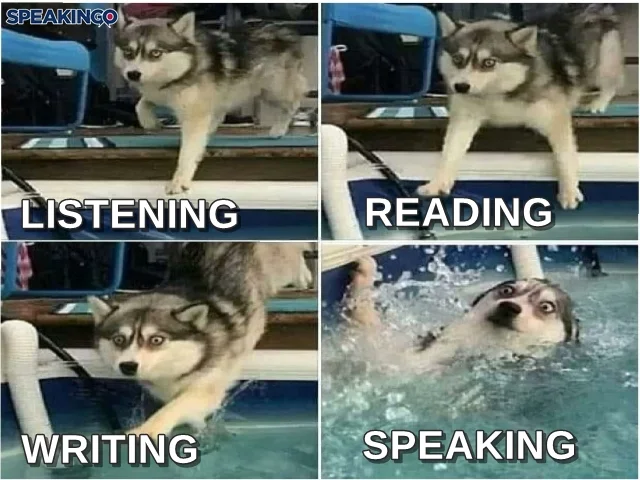What kind of an English as a foreign language is “practical”? As usual, we can expand on this simple question to provide a complicated answer to the question of what kind of English course you are really looking for.
What does a practical English course look like?
Who would like to learn English tyke in theory? Everyone would like to learn English “practically”!
However, the slogan “practical English course” can refer to many different aspects of English language learning. As I was thinking about what we can mean by a “practical English course” three ideas came to mind, which from my teaching perspective I will discuss in more detail shortly. That is:
Table of Contents:
- Practical course that is to learn specialist English vocabulary.
- Practical means flexible in time schedule and no commute.
- Less theory and more practice while learning.
1. A practical English course, i.e. one with specialized vocabulary
If I were planning to go to England and take a job in the health service (NHS), I would undoubtedly want to learn specialized, industry-specific vocabulary related to my profession. This is very practical! Why should I learn words like “trowel” or “rhubarb” if I’m going to pull Englishmen’s teeth?
Therefore, without a doubt, a practical English course will be one that prepares us directly for our profession.
There’s no point in trying to learn all the hundreds of thousands of English words – it’s best to learn the ones we’ll practically use in daily life and at work!
With industry-specific, specialized words the matter, contrary to appearances, is not so difficult. Often ESOL learners already know them because they have penetrated into every language or they come from Latin. Usually there are not so many of them again and they can be learned relatively quickly.

Technical English is not everything!
Unfortunately with specialized vocabulary alone we won’t get far! Not only do we need grammar, but those most popular English words which go appear in almost every conversation, in every industry, on every topic! Also at a social gathering on Friday night after work.
Therefore, in addition to specialized vocabulary, you also need to learn those most common, general English words. For example, you will find and, that or have in almost every sentence!
For Speakingo’s online English course, I created a list of the 2,000 most popular words. I drew on computer statistics of word usage on the Internet, in the media and the corpus of words used in Simple Wikipedia. It’s safe to assume that by knowing just these 2,000 (out of hundreds of thousands!) English words, you’ll be able to understand 90% of conversations in the language. Isn’t this the most practical approach possible?

See also: Free English test.
2. Practical i.e. flexible in time and without commuting
Well, I’m sure you’ll admit yourself that trudging through an hour of traffic (and sometimes only one way!) to get to an hour-long English lesson is not particularly practical…. Time is money; it is a resource worth using wisely.
In the 21st century, the Internet opens up almost unlimited possibilities for remote learning via the Internet. Online lessons are very practical – we don’t waste time commuting, we don’t have to leave the house in bad weather, we don’t have to put on makeup or dress up in any particular way – we just turn on the computer and start learning! At most, we say that the camera broke for us! 🙂
On the Internet, you can learn with a live person through some kind of communicator (Skype, Zoom, Teams, etc.). However, this way of learning has two impractical drawbacks:
- first of all, you have to make an appointment with this (wo)man for a certain time, so you lose time flexibility, and you can’t always plan your time like this a week, a month ahead. What’s more, sometimes we have some free time at random times of the day, but then we can’t grab the phone and do a lesson via smartphone because our English teacher will be busy at the time, and besides, he or she may not be ready or willing to do a 20-minute lesson just because we happen to have a moment of time.
- Secondly, classes with a live person will always be relatively expensive, especially if you want to study intensively, that is, have a lot of lessons.
Practical English learning on online platforms
Therefore, much more practical from the point of view of flexibility and price are English courses on online platforms that do not require contact with a live person. Here we decide for ourselves when and where we want to learn English, we follow a teaching path arranged by a specialist. Therefore, although such e-learning is not without drawbacks (it requires more self-discipline and determination), it is undoubtedly a more flexible way to learn English. And – secondly – usually much, much cheaper than lessons with a live person.
It is worth noting here that such a course should not focus too much on single words (which we do not know how to use in a sentence later), or theoretical grammar. And ideally, such a course should teach us to speak practically, to make a throaty sound, and not just to guide students around the screen or move blocks of words. That’s why I recommend the Speakingo English course, where learning is based on voice conversation in English! But more about this phenomenal method at the end!

3. Less theory more practice while learning English!
Above all, however, when we hear about a practical English course, we probably mean that there should be less dry theory and more practice. It’s hard to disagree with that!
In general, theory is pleasant (especially in teaching – from the teacher’s podium, one can shine like a fountain of linguistic wisdom, sprinkled with complicated philological terms and so on…), but from a practical point of view, its usefulness for students is…. questionable, to say the least.
No one in the heat of conversation on the street has time to ponder the meanderings of using the Future Perfect Continuous tense. We need to have the habit of speaking English correctly, which can be learned exclusively through oral practice.
I’m not saying that learning grammar is bad. The question is, however, for what purpose do we learn English? If in order to become an English teacher, we should take a little lick of this grammar. Or if you plan to pass an exam, since tests usually verify mainly grammar knowledge. Also, if we have to write a lot, then we can actually flip through the pages of a grammar textbook calmly at each sentence and remind ourselves which rule applies in this case and why it is an exception in this case, however….
However, if we want to speak English – we just have to start speaking English!
A practical English speaking course is one that doesn’t deal extensively with school rules, but teaches us how to use living, practical English! It does not give abstract lists of vocabulary words to cuss, but whole sentences, linguistic “ready-made” chunks, that can be practically applied in real conversations. This is an obvious, scientifically proven, but for some reason underestimated way of learning English that no one talks about.
During actual conversations, learners don’t have time to glue together vocabulary words with grammar rules – one needs to make a habit of speaking English. Therefore, a practical English course must keep grammar to a minimum and focus as much as possible on practice, on speaking, in order to build this habit of speaking English freely and correctly.

Speakingo’s hyper-practical online English course
If we consider the above thoughts, it turns out that Speakingo’s online English course is not only practical…. it is hyper-practical!
Why?
- The didactics in the Speakingo course include 2,000 of the most popular words, the knowledge of which allows learners to understand 90% of the conversation.
- Speakingo is an online course, meaning you can learn when you want and where you want, any time of the day or night, with no time wasted on commuting to brick and mortar language school!
- Learning at Speakingo is 100% based on conversation – like a child you acquire correct grammatical structures. The effect is that, as in the mother tongue, you don’t know why, but you know it’s correct and there!
- You don’t waste time on unnecessary theory (you can always read about it on my blog). Instead, you practice answering questions and break through the language block until you find that you no longer have trouble speaking English!
- What’s more, learning at Speakingo is not only effective, but also simple and enjoyable – it allows you to spend your free time during the day nicely but practically at the same time!
Anyway, it’s best to see for yourself or on your own if this method of learning English suits you!
Download the app on your phone or register on www, and you get a free week to test your English learning on Speakingo’s practical English course – no obligation and completely free!
And remember: Not knowing English is very impractical!
And what do you understand by the term practical English course? Did I forget something? Write your thoughts in the comments!
Enroll in Speakingo’s hands-on online English course today!
























